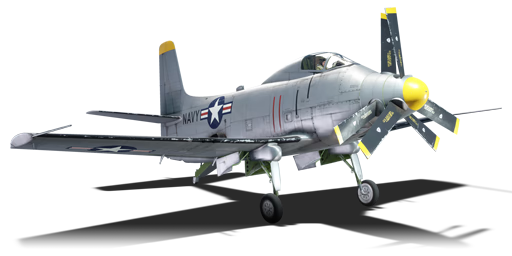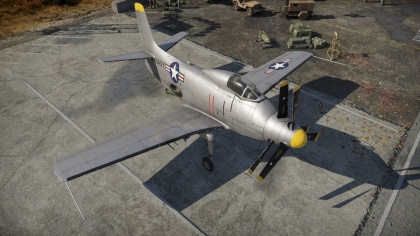Difference between revisions of "A2D-1"
(→Survivability and armour: Added in Game performance.) (Tag: Visual edit) |
m (→Survivability and armour) (Tag: Visual edit) |
||
| Line 113: | Line 113: | ||
=== Survivability and armour === | === Survivability and armour === | ||
| − | The A2D1 has no protection for the Pilot which makes it very vulnerable to AAA and other Aircraft. The radar is also vulnerable. Belly landings normally result in the tail being ripped off and the aircraft breaking the wings. The engines perform well even when damaged and can fly with one heavily damaged and one operational. Rolling with negative G's can rip the wings off. Fires | + | The A2D1 has no protection for the Pilot which makes it very vulnerable to AAA and other Aircraft. The radar is also vulnerable. Belly landings normally result in the tail being ripped off and the aircraft breaking the wings. The engines perform well even when damaged and can fly with one heavily damaged and one operational. Rolling with negative G's can rip the wings off. Fires can be quite common. |
== Armaments == | == Armaments == | ||
Revision as of 14:28, 29 October 2019
Contents
Description
The A2D-1 Skyshark is a premium rank American attacker
with a battle rating of (AB), (RB), and (SB). It was introduced in Update 1.89 "Imperial Navy".
General info
Flight performance
Describe how the aircraft behaves in the air. Speed, manoeuvrability, acceleration and allowable loads - these are the most important characteristics of the vehicle.
| Characteristics | |||||||
|---|---|---|---|---|---|---|---|
| Stock | |||||||
| Max Speed (km/h at 8,534 m) |
Max altitude (meters) |
Turn time (seconds) |
Rate of climb (meters/second) |
Take-off run (meters) | |||
| AB | RB | AB | RB | AB | RB | ||
| 796 | 796 | 20.6 | 21.2 | 32.4 | 32.1 | 350 | |
| Upgraded | |||||||
| Max Speed (km/h at 8,534 m) |
Max altitude (meters) |
Turn time (seconds) |
Rate of climb (meters/second) |
Take-off run (meters) | |||
| AB | RB | AB | RB | AB | RB | ||
| 796 | 796 | 19.5 | 20.0 | 36.4 | 34.4 | 350 | |
Details
| Features | ||||
|---|---|---|---|---|
| Combat flaps | Take-off flaps | Landing flaps | Air brakes | Arrestor gear |
| ✓ | ✓ | ✓ | ✓ | ✓ |
| Limits | ||||
|---|---|---|---|---|
| Wing-break speed (km/h) |
Gear limit (km/h) |
Combat flaps (km/h) |
Max Static G | |
| + | - | |||
| 600 | ~9 | ~4 | ||
| Optimal velocities | |||
|---|---|---|---|
| Ailerons (km/h) |
Rudder (km/h) |
Elevators (km/h) |
Radiator (km/h) |
| < 460 | < 480 | < 460 | N/A |
| Compressor (RB/SB) | ||
|---|---|---|
| Setting 1 | ||
| Optimal altitude | 100% Engine power | WEP Engine power |
| 1,000 m | 5,034 hp | N/A |
Survivability and armour
The A2D1 has no protection for the Pilot which makes it very vulnerable to AAA and other Aircraft. The radar is also vulnerable. Belly landings normally result in the tail being ripped off and the aircraft breaking the wings. The engines perform well even when damaged and can fly with one heavily damaged and one operational. Rolling with negative G's can rip the wings off. Fires can be quite common.
Armaments
Offensive armament
The A2D-1 is armed with:
- 4 x 20 mm T31 cannons, wing-mounted (200 rpg = 800 total)
Suspended armament
The A2D-1 can be outfitted with the following ordnance:
- Without load
- 20 x 250 lb AN-M57 bombs (5,000 lb total)
- 20 x HVAR rockets
- 10 x 500 lb AN-M64A1 bombs (5,000 lb total)
- 2 x 1,000 lb AN-M65A1 bombs (2,000 lb total)
- 2 x 2,000 lb AN-M66A2 bombs (4,000 lb total)
- 2 x 2,000 lb AN-M66A2 bombs + 8 x 500 lb AN-M64A1 bombs (8,000 lb total)
- 2 x 2,000 lb AN-M66A2 bombs + 20 x HVAR rockets (4,000 lb total)
- 2 x Mk.13/44 torpedoes
Usage in battles
Describe the tactics of playing in an aircraft, the features of using aircraft in a team and advice on tactics. Refrain from creating a "guide" - do not impose a single point of view, but instead, give the reader food for thought. Examine the most dangerous enemies and give recommendations on fighting them. If necessary, note the specifics of the game in different modes (AB, RB, SB).
Radars
The A2D-1 is equipped with an AN/APS-19 search and tracking radar. The radar is mounted in nose, inside the propeller hub.
| AN/APS-19 - Target Detection Radar | |||
|---|---|---|---|
| Maximum Detection Range |
Guaranteed Detection Range |
Max Azimuth Scan Angle |
Max Elevation Scan Angle |
| 60,000 m (theoretical) |
7,200 m | ±67.5° | ±67.5° |
| AN/APS-19 - Target Tracking Radar | |||
| Maximum Tracking Range |
Minimum Tracking Range |
Azimuth Tracking Angle |
Elevation Tracking Angle |
| 1,500 m | 150 m | ±15° | ±15° |
Manual Engine Control
| MEC elements | ||||||
|---|---|---|---|---|---|---|
| Mixer | Pitch | Radiator | Supercharger | Turbocharger | ||
| Oil | Water | Type | ||||
| Not controllable | Not controllable Not auto controlled |
Not controllable Auto control available |
Not controllable Auto control available |
Combined | Not controllable 1 gear |
Not controllable |
Modules
| Tier | Flight performance | Survivability | Weaponry | |||
|---|---|---|---|---|---|---|
| I | Fuselage repair | Radiator | Offensive 20 mm | M64 | ||
| II | Compressor | Airframe | M65 | FRC mk.2 | ||
| III | Wings repair | Engine | New 20 mm cannons | Mk.13 | ||
| IV | Cover | M66 | ||||
- As a premium aircraft, the A2D-1's modifications are automatically unlocked upon purchase of the aircraft.
Pros and cons
Pros:
- Possesses tracking and search Radar
- 20mm cannon armament
- Naval aircraft capable of carrier-landing
- Powerful turboprop engines
- Impressive payload options
- Premium bonuses
Cons:
- Time limit on radar
- Tracking Radar only works at < 1 km
- Extremely large target
- Tail of aircraft is fragile
- Rather slow aircraft compared to its enemy competitors
History
In the early years following the war, jet engines underwent rapid development. This attracted the interest of the US Navy, which sought to arm itself with aircraft that were superior to that of potential opponents in speed, altitude, payload, and flight range.
As it turned out, jet engines were perfect for fighter aircraft but too “voracious” for strike aircraft, as they significantly reduced their range. The best engineering solution was to introduce the turboprop engine, which was a task the Douglas company undertook.
Initially, engineers simply wanted to replace the piston engine of the Skyraider attack aircraft with a turboprop engine. However, this led nowhere and the vehicle required significant modification. In the end, the engineers settled on a prototype with Allison Т-40А-2 turboprop engines and coaxial propellers.
The first flight of the XA2D-1 prototype, called the Skyshark, took place on May 26, 1950, but engine vibration nearly destroyed the aircraft and it was forced to land after only two minutes. By December 1950, the prototype had already completed over a dozen flights. However, a routine flight on December 19, 1950, ended in tragedy. Due to issues with the engine, the vehicle and pilot crashed. Nevertheless, testing continued and, despite the many technical problems that plagued the aircraft, the army ordered 10 pre-production models of the A2D-1. However, on August 5, 1954, another accident occurred when the main gearbox failed, and the aircraft crashed a short distance outside Los Angeles. This time, the pilot managed to escape the aircraft, but the project was closed and it was decided to dismantle any existing prototypes. Apparently, this decision was influenced by the fact that in the same year for the first time Douglas got another project in the air, this later became the famous A4D Skyhawk - a new generation of jets.
- From [Devblog
Media
Excellent additions to the article would be video guides, screenshots from the game, and photos.
See also
Links to the articles on the War Thunder Wiki that you think will be useful for the reader, for example:
- reference to the series of the aircraft;
- links to approximate analogues of other nations and research trees.
External links
| USA strike aircraft | |
|---|---|
| Douglas | A-20G-25 · A-26B-10 · A-26B-50 · A2D-1 · AD-2 · AD-4 · A-1H |
| North American | A-36 · PBJ-1H · PBJ-1J |
| Other | AM-1 · AU-1 · XA-38 |





